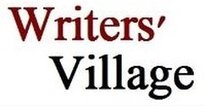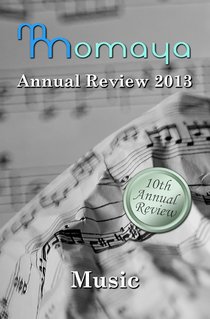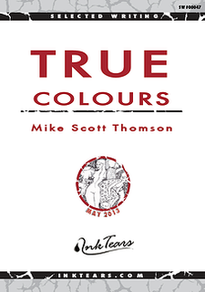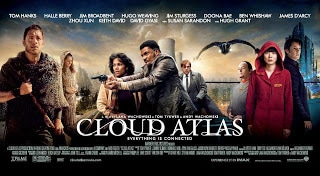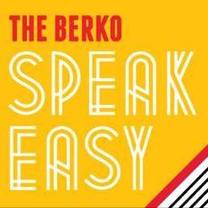| Writers' Village is a marvellous online resource for both new and established writers, offering a variety of courses, articles and handy hints about the world of writing and publishing. In addition to this, they also run a hotly-contested annual short fiction contest... I'm very pleased and proud that my comic short story "Monty Jackman's Exposition" has come 2nd in their 2013 competition! Read my story, plus the winner and other highly-placed works, by clicking here. |
Last weekend I finally got around to watching Cloud Atlas. I say finally, because I’m still none the wiser why we had to wait several weeks for its release in the UK, when it was on in the USA in September 2012. I expect the precise reasons for this are depressingly dull, dry excuses to do with scheduling or budget or whatever, but still: it was somewhat unfair, I thought. Especially as the book was written by a British author and the film had many British actors. But it was well worth the wait. David Mitchell is one of my favourite authors, and Cloud Atlas one of my all-time favourite books. (It’s worth noting he wrote Cloud Atlas at the same age I am now. Makes one sick, frankly.) I like it not only due to its sheer ambition, scope and myriad of genres and themes, but also because it’s essentially six short stories, artfully meshed together. A real genre-bender, and gripping tales to boot. But what I was really looking forward to, much like I do every time I see a film based on a book I’ve read, is to see the director’s - and the actors’ - own interpretations. I’ve always wondered what it must be like as an author to have your work given new, independent treatment. Mitchell himself, in the preface of the re-issued Cloud Atlas, puts it well. If I may borrow his words briefly: ... First off, there’s a primal kick to be had from seeing and hearing your word made flesh... before your very eyes, actors are speaking dialogue you wrote in your back bedroom years ago... all these non-existent people are now real... they find flashes of humour and menace which you never spotted... Four days after watching the film - and just as the circulation began to return to my legs (nobody told me it was THREE HOURS LONG) - I got the merest glimpse of what Mitchell must have felt. One of the short stories I wrote last year was a 2,000 word piece called "Me, Robot". It’s a comic, somewhat sad tale of a man who finds himself out of work, cannot bring himself to tell his wife, and decides to spray himself with paint, busking in public as a human statue/robot to top up his dole money. I was delighted when it was picked up by The Fiction Desk - you can read my original blog about it here, or my guest post for them about the background to the story here. However, there was more to come. Rob from The Fiction Desk sent a copy of the book to the Berko Speakeasy, a Berkhamsted-based theatre/literary group who put on “short story cabarets”. They were looking for stories to perform at their event on the 6th March, and soon identified my tale as one which would work well as a performance piece. I had an email from them. Was it OK to use my story? Too right it was. Before the evening, I was eagerly anticipating seeing how my character would be portrayed. Previously I’ve had work read out before, but each time they’ve been straight readings, usually done by and for other writers for the purposes of workshopping or critique. This was the first time I would witness a story of mine read purely for entertainment, interpreted by a proper actor. More to the point, would he dress up? Completely inadvertently, I had become a playwright. (Well OK, not exactly, but I like the phrase “inadvertent playwright”, so I’m sticking with it). And what an evening it was. Taking place in the Greene Room of the Kings Arms Hotel in Berkhamsted, the room had been decorated according to the themes of the stories; tiger print tablecloths, flies, a severed hand hanging by the bar. Even the tables had little trinkets related to each tale. (These included dog biscuits, paper flies, pairs of swimming goggles and a tiny pairs of metal handcuffs). For the next couple of hours, the audience of approximately a hundred people were treated to enthusiastic and vividly interpreted tales by Guy de Maupassant, Rajesh Parameswaran, Carys Davies, Toby Litt and Miranda July. My story was on last. Huge kudos to the actor Will Harrison-Wallace for – huzzah! – dressing the part: he’d actually attired himself in silver clothes, donned sunglasses and painted his face. All because of me. Top marks, that man. He strode on, sat on a chair (as per the police station setting of my story), then started to read all those words very, very familiar to me, an experience both surreal and wonderful at the same time. Just like David Mitchell had said: I was seeing and hearing my words made flesh; the non-existent person made real. I’ve heard of writing characters which “leap off the page”. Here, I was literally seeing it happen. It’s an immensely satisfying feeling. All writers, I’m sure, want to see their work read, appreciated, enjoyed, understood, remembered. When a piece is published, you hope it becomes all of these things, but of course there is never any guarantee. If you’re lucky, someone may drop you a note online, or be nice about it in a review, but that’s about it. But thanks to Will Harrison-Wallace’s interpretation and the audience’s positive reaction, I was able to witness this first hand.
So, huge thanks to Julie Mayhew and Ian Skillicorn from the Berko Speakeasy, Will Harrison-Wallace for being such a convincing and engaging “robot” (click here to see "Boss Boot Camp", a brilliant short film he was in!), and also thanks again to Rob Redman from the Fiction Desk for publishing it in the first place. Postscript: the very evening following the Berko Speakeasy, I found out that another of my short stories, “True Colours”, has been selected from hundreds of entries to make the shortlist of the 2012 Ink Tears Short Story Competition. What an excellent week! When asked why I write short fiction, I always say three things: 1) It’s great practice – far better for a budding writer to make mistakes on an imperfect short story, than spend months to years on a poor novel 2) With a short story, you may actually get the satisfaction of finishing something! (Which is not to say short stories are easy – they’re a very different discipline to novels and certainly not easy to do well – perhaps a topic for another blog post…?) 3) With a ‘catalogue’ of short fiction under your belt, it’s a way to build up a profile – especially if you can get some competition wins to add to your CV. Competitions, then. Winning them (provided they’re reputable ones of course!) is a sure fire way to critical acclaim, wider attention and, in most cases, publication of the winning story. What’s not to like? Over the past year or so I’ve tried my hand with a few. Usually, of course, I’ve failed to make any mark whatsoever. This is par for the course: rejections are part of writing, as any writer (or wannabe writer) should know. I’ve worked out, as a rough guess, that the chances of making any kind of win or placing in any given competition is 1%. For example, a short story competition may receive 500 entries; they’ll be a 1st place, 2nd place and three honorary mentions, so 5 ‘hits’ altogether. A more prestigious competition may receive 5,000 entries; a published shortlist of 50 will typically be drawn up. Again, 1%, give or take. I suppose that’s down to your own definition of ‘competition success’, but personally I would regard any placing as a result. Possibly it’s a crude way of looking at it – some will be more, some will be less - but this percentage for a competition ‘hit’ seems about right to me. In short, getting anywhere in competitions is extremely hard – you really do have to be at the top of your game (plus, inevitably, enjoy the merest smidgen of luck). Across the Internet there are a number of worthwhile sites which give tips for competition success – here is a good set of guidelines for how to maximise your chances of winning competitions, and this is a good one, advising of ways to select the most worthwhile competitions out there. We may as well be honest – failing is not a nice feeling. It means somebody out there doesn’t like your work (or like it enough – but of course the paranoid fringes of the imagination will always swing toward the former). It’s also a constant reminder that there are writers out there ‘better’ than you. In an ideal world, this kind of competitiveness would not even exist – writing and storytelling, in and of themselves, need not necessarily have a competitive edge – but for those who want to eventually be published, this is the world we live in. Entering, and failing, competitions enables the rapid growth of a thick skin. Yet it’s worth remembering a few things (and it’s something I always have to consider after my latest unsuccessful attempts). Firstly, all judges on writing competitions are subjective. Sure, they may have certain criteria for which they’ll award marks – such as plot, character, voice and pace – but how they’ll judge those are very much up to them. The writer Julian Barnes, current winner of The Booker Prize, referred to the very same award a few years back as ‘Posh Bingo’. Of course a writer will clearly maximise their chances by submitting a brilliant piece of work, but it’ll still be at the mercy of the whims of the judges. Pleasing a fellow scribe with your wordplay to warrant a prize should be satisfying if it happens, but if it doesn’t, it shouldn’t be cause for too much crushing disappointment. Other readers, those reading your work without a score system in mind, may well have completely different views. There’s something to be said for gut instinct and liking something just because! Secondly, failing to win a competition – especially if the contest’s judge gives you feedback – is a superb way of identifying the weak points of your entry and making subsequent improvements. Earlier this year I entered one story in three different competitions simultaneously; it failed to get a placing in any of them. I came back to it a month later and re-read the opening paragraph. The extent of its dullness was breathtaking to behold; how it managed to get past my own ‘quality’ control check before submission is something I’m chalking down to essential experience. Nobody else would have been compelled to read on, not least by busy competition judges; I wouldn’t be surprised if they didn’t even make it past the first fifty words and in the whole thing went into the shredder. Whether or not it will now win a future competition is a moot point: at least it is better for having been through the critical mill. Thirdly, competitions really should not, in my opinion, be the be-all and end-all for aspiring writers, just as they are not for established authors (refer again to Julian Barnes’ comment about the Booker Prize for a case in point). They’re one way to build up an author’s profile, but they certainly shouldn’t be the only way. Anthologies, story slams, literary festivals, magazines, publishers and good old fashioned networking are but a handful of the other ways a writer can bring their work to wider attention. Although it can be argued that all of these things too have the element of competition (in that only what is deemed the very best work will suffice), at least they may not necessarily have the same constraints, or the all-prevailing feeling of being ‘judged’, that a competition may have. It’s possible that some writers out there do regard winning competitions as an ‘end’ rather than a ‘means’ – fair play to them if so – but that’s not something I personally want to get into. The reason for this, in my own mind, is simple: I want my own good writing, if it is indeed good enough, to be rewarded, full stop – not good ‘competition’ writing, if such a thing can exist. If I am to tailor my work with a specific prize in mind, surely the only person I would be rewarding is myself, and not the reader. Surely keeping true to your own voice should come first: if it’s any good, it’ll get out there somehow. Having said all the above, and speaking personally for a moment, I was very pleased to be awarded an honorary mention for one of my short stories in the May 2012 competition on Five Stop Story. They’re a great site where new and emerging authors can submit their short fiction (readable in five stops on the Tube, hence their name) – ten are selected every month for publication on their webpage and their very neat iPhone/iPad app.
The reason I am particularly taken with this lot is that unlike various other competitions for writers (where I sometimes wonder who else is going to read the results other than the writers themselves), this service is designed very much with readers in mind. You can read my story, as well as the winner, runner up and all the other mentions, here. |
Archives
May 2021
Categories
All
|
